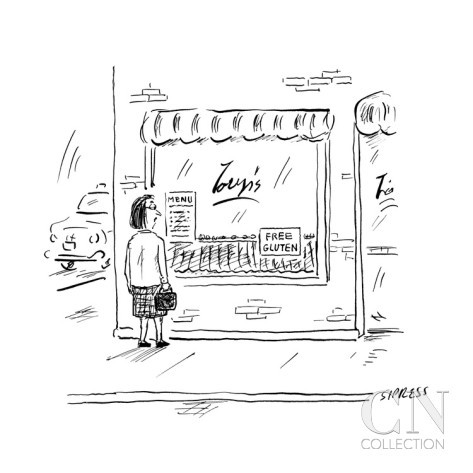Going “Gluten Free” is for Rich People

I got to go into an office today, which was a Big Deal. I tucked my shirt in! It was exciting: there were people — most of them bearded and wearing plaid, but still, people — and there was free pizza. As I munched happily away on my grandma slices, I thought about the recent New Yorker article about gluten.
Sales of gluten-free products will exceed fifteen billion dollars by 2016, twice the amount of five years earlier. The growing list of gluten-free options has been a gift for many children, who no longer have to go through life knowing that they will never eat pizza, cookies, or cake. … For many people, avoiding gluten has become a cultural as well as a dietary choice, and the exposition offered an entry ramp to a new kind of life. There was a travel agent who specialized in gluten-free vacations, and a woman who helps plan gluten-free wedding receptions. One vender passed out placards: “I am nut free,” “I am shellfish free,” “I am egg free,” “I am wheat free.” I also saw an advertisement for gluten-free communion wafers.
The author quotes one of the nation’s foremost gluten specialists and celiac doctors, whose diagnosis is that the gluten free phenomenon is not nearly as much about health as it is about class:
“I recently saw a retired executive of an international company. He got a life coach to help him, and one of the pieces of advice the coach gave him was to get on a gluten-free diet. A life coach is prescribing a gluten-free diet. So do podiatrists, chiropractors, even psychiatrists.’’ He stopped, stood up, shook his head as if he were about to say something he shouldn’t, then shrugged and sat down again. “A friend of mine told me his wife was seeing a psychiatrist for anxiety and depression. And one of the first things the psychiatrist did was to put her on a gluten-free diet. This is getting out of hand. We are seeing more and more cases of orthorexia nervosa” — people who progressively withdraw different foods in what they perceive as an attempt to improve their health. “First, they come off gluten. Then corn. Then soy. Then tomatoes. Then milk. After a while, they don’t have anything left to eat — and they proselytize about it.”
Ah yes. If you meet a gluten free person who doesn’t proselytize, or a Paleo one for that matter, congratulations, and you should ask them where they keep their pot of gold, because you’ve encountered a leprechaun. Whether the hunger makes them giddy, or the excessive willpower necessary to keep them from stage diving onto a tray of muffins means they have no willpower left to keep themselves from preaching, I don’t know, but man do people who give up food love to talk about it.
Also relevant: the class component. Is gluten free food more expensive than the regular versions, I wondered. The answer is yes. Here is a study called Gluten Free and Regular Foods: A Cost Comparison.
All 56 gluten-free products were more expensive than regular products. The mean (+/- standard deviation) unit price for gluten-free products was $1.71 (+/- 0.93) compared with $0.61 (+/- 0.38) for regular products (p<0.0001). On average, gluten-free products were 242% more expensive than regular products (+/- 212; range, 5% to 1,000%).
Here are some more links:
A Gluten-Free Diet: How Much Will It Cost You
The High Cost of Gluten-Free Foods
How to Afford the Cost of Gluten-Free Food
The high price of GF foods sucks for people who are actually celiac or have serious allergies / sensitivities to gluten. But it seems like, in large part, going GF is a way of asserting class status, of saying “I have enough money to be super choosy and restrictive about what I eat.” Which is fine! Everyone’s allowed to have their priorities. If you can’t afford those priorities, though, don’t feel too bad. Sit by me and share my pizza. It’s delicious.
Cartoon via The New Yorker
Support The Billfold
The Billfold continues to exist thanks to support from our readers. Help us continue to do our work by making a monthly pledge on Patreon or a one-time-only contribution through PayPal.
Comments